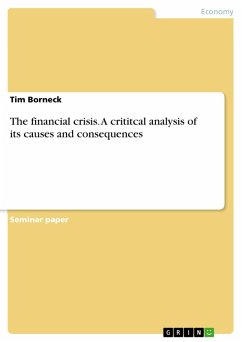Seminar paper from the year 2015 in the subject Economics - Finance, grade: 1,7, University of Applied Sciences Essen, language: English, abstract: In 2007 the biggest financial crisis after the ‘Great Depression’ of 1939 took place. One theoretical framework explaining financial crises of that kind was envisioned by Hyman P. Minsky (1919-1996) in the latter half of the 20th century and was not considered in this context for a long time. The most prominent part of the theoretical framework, the financial instability hypothesis (FIH), emphasises that “modern capitalist system is prone to bouts of relative instability and financial collapse. When the storm in 2007 broke it was discovered again and the world began to talk about a ‘Minsky moment’. Prominent economics called the theory a required reading and championed it as visionary. Therefore it is no surprise that the book about his FIH was traded at prices over 2000 US$ right after the financial crisis. Until the year 2007 the economic world followed another school of thought. The so-called neoclassic described a world in which financial crises would only occur if ex-ogenous shocks would disturb the self-regulating power of the markets. In detail this is called the efficient market hypothesis (EMH). In addition means this that financial crises caused by systemically reason are not part of the theoretical model. On the contrary, Minsky described a cyclical model which tries to implement loan rela-tionships, financial institutions, financial innovations and uncertainty in the analysis of the modern capitalism. An emphasis lays on the financing structure of different eco-nomic players and the role of financial institutions regarding their influence on the real economy. Minsky’s theory is based on the whole economic cycle and really tries to explain how financial crises are actually caused. Additionally other authors see the thoughts of Minsky as an acknowledged theory regarding financial crises in the past. Although all these factors make the theory interesting for the recent crisis and different economics had called the financial crisis a Minsky moment a huge discussion if the theory is really applicable came up. Further if the theory is really applicable the next question would be which consequences have been drawn in order to prevent another crisis.

